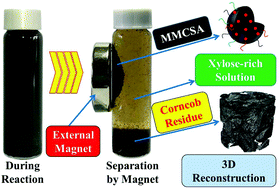An efficient magnetic carbon-based solid acid treatment for corncob saccharification with high selectivity for xylose and enhanced enzymatic digestibility†
Abstract
An effective method for corncob saccharification was investigated over a magnetic carbon-based solid acid (MMCSA) catalyst in the aqueous phase. MMCSA was synthesized through a simple and inexpensive impregnation–carbonization–sulfonation process. Under the optimal reaction conditions (150 °C, 2 h, 0.5 g corncob, 0.5 g catalyst and 50 ml deionized water), 74.9% of xylose yield was directly obtained from corncob, with 91.7% cellulose retention in the residue. After the reaction, the MMCSA was easily separated from the residue using an external magnet and reused 4 times, showing its high stability and catalytic activity. The enzymatic digestibility of the pretreated residue reached 95.2%, with a total sugar yield of 90.4%. The morphological and structural properties of the natural and treated corncobs were analyzed primarily through 3D X-ray microscopy to characterize the cell wall thickness, porosity, and pore surface area distribution. The increase of macropores (pore surface areas >200 μm2) was beneficial for the accessibility of cellulose to cellulosic enzymes, so the enzymatic digestibility was enhanced immediately. Compared with other traditional hydrolysis methods, this two-step hydrolysis approach represents an environmentally friendly and sustainable saccharification of lignocellulose to produce xylose and glucose while achieving the same level of reaction efficiency.

- This article is part of the themed collection: Green Biorefinery Technologies based on Waste Biomass


 Please wait while we load your content...
Please wait while we load your content...